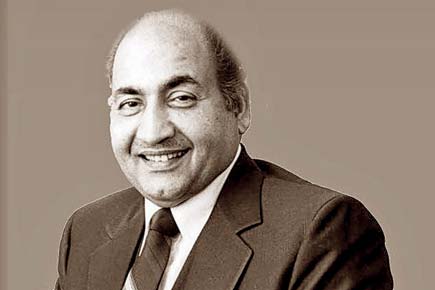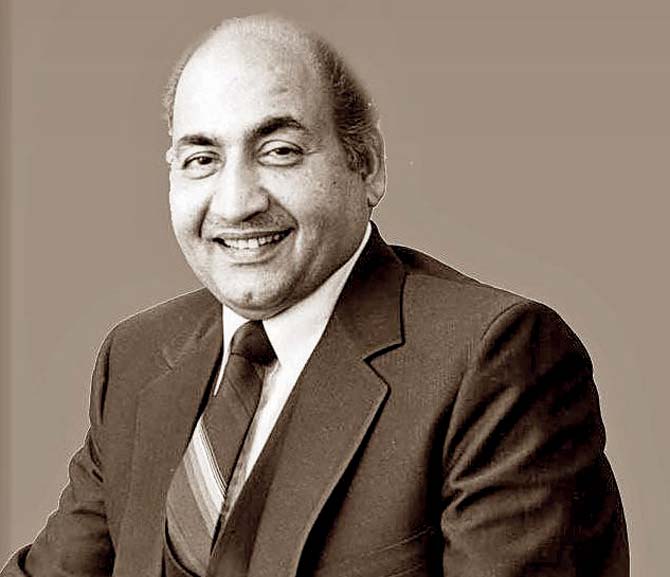Recently there was a call to boycott the new Karan Johar film because of the dialogue, “Rafi rote zyada aur gaate kam the.” Some fans of Mohammed Rafi thought this was an insult


Singer Mohammed Rafi’s (in pic) son slammed director Karan Johar over a line in the movie Ae Dil Hai Mushkil, which stated that Rafi cried, not sang, in his songs
ADVERTISEMENT
 Recently there was a call to boycott the new Karan Johar film because of the dialogue, “Rafi rote zyada aur gaate kam the.” Some fans of Mohammed Rafi thought this was an insult. That’s ironic for in the film it is really a clue to the character’s impending come-uppance. They believe life is easy; love is lilting songs in sylvan surroundings. In the course of the film, they discover love is painful and complicated and cry a whole lot, himself. One may say they learn to appreciate the beauty of a sad song, which once, they casually dismissed.
Recently there was a call to boycott the new Karan Johar film because of the dialogue, “Rafi rote zyada aur gaate kam the.” Some fans of Mohammed Rafi thought this was an insult. That’s ironic for in the film it is really a clue to the character’s impending come-uppance. They believe life is easy; love is lilting songs in sylvan surroundings. In the course of the film, they discover love is painful and complicated and cry a whole lot, himself. One may say they learn to appreciate the beauty of a sad song, which once, they casually dismissed.
Mohammed Rafi is without doubt a national icon. So, to whom then does he belong? That would depend on which Rafi we were talking about, na?
Because there is a Rafi of all our bus journeys singing Bombay’s unofficial anthem, “Ae dil hai mushkil jeena yahan.” There’s the Rafi who sang the painfully devotional “man tadpat Hari darshan ko aaj” (my heart aches for a glimpse of my lord Hari) whom my father loved. The one who sang for Dev Anand “apni toh har aah ek toofan hai..dil hi toh hai usne shayad bhool bhi ki hai” (it’s a heart after all, surely it’s made some mistake, a storm rages in every sigh I take) whom I adore. There’s also the Rafi that once played in every Mumbai cab in the 1990s – plaintive songs of men who refuse to recover from heartbreak – whom I don’t like at all. The cab drivers all clearly did. Rafi belongs to all of these people, who listen to or think about his music in some way — even those who do so critically.
When I was young I’d say, “Oh I’m more of a Kishore fan.” Because when you are young you imagine that you can only be one thing: a Kishore or a Rafi, a Lata or an Asha, a Jane Austen or George Eliot fan. Life shows you there is no such compulsion. We love different artists at different moments, and sometimes differently. We discover new facets of them, and through them we discover new facets of ourselves and vice versa. Art is important because it gives expression to all these different selves and experiences.
Artists want to find the hidden secrets of our hearts and sing them out so we feel affirmed. That is what makes our relationship with artists intensely personal – it cannot be defined by anyone. Nor would the artist ask that, for artists rely on this intimacy with their fans, this emotional connection of love, expectation and disappointment – they give us a right to it.
It is strange that any one might object to this apnapan, which allows us to say what we feel about an artist. After all, we are a culture that sometimes curses our gods, where some call their mothers “tu” but not out of disrespect, out of intense sense of a claim.
Hindi film songs in fact symbolise this rich emotional world of intimate connections. The multiple Rafis in Mohammed Rafi songs symbolically affirm that many opinions, emotions and relationships can co-exist and be equally valid. How can anyone dicate this dil ka afsana? Artistes belong to no one because they belong to everyone.
That is what they set out to do and we must respect that if we love them.
Paromita Vohra is an award-winning Mumbai-based filmmaker, writer and curator working with fiction and non-fiction. Reach her at www.parodevipictures.com
 Subscribe today by clicking the link and stay updated with the latest news!" Click here!
Subscribe today by clicking the link and stay updated with the latest news!" Click here!






